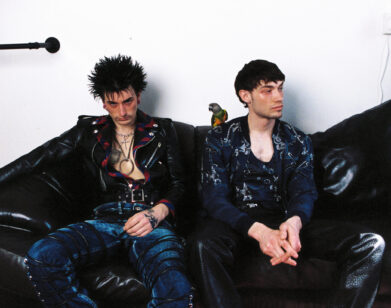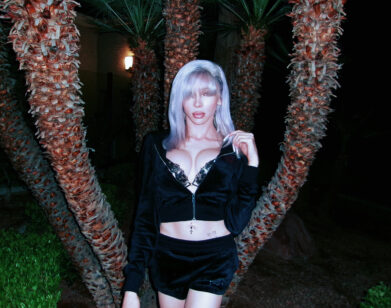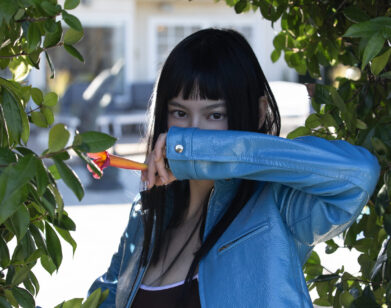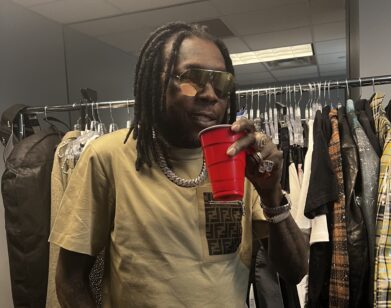Cut Copy Lets Go
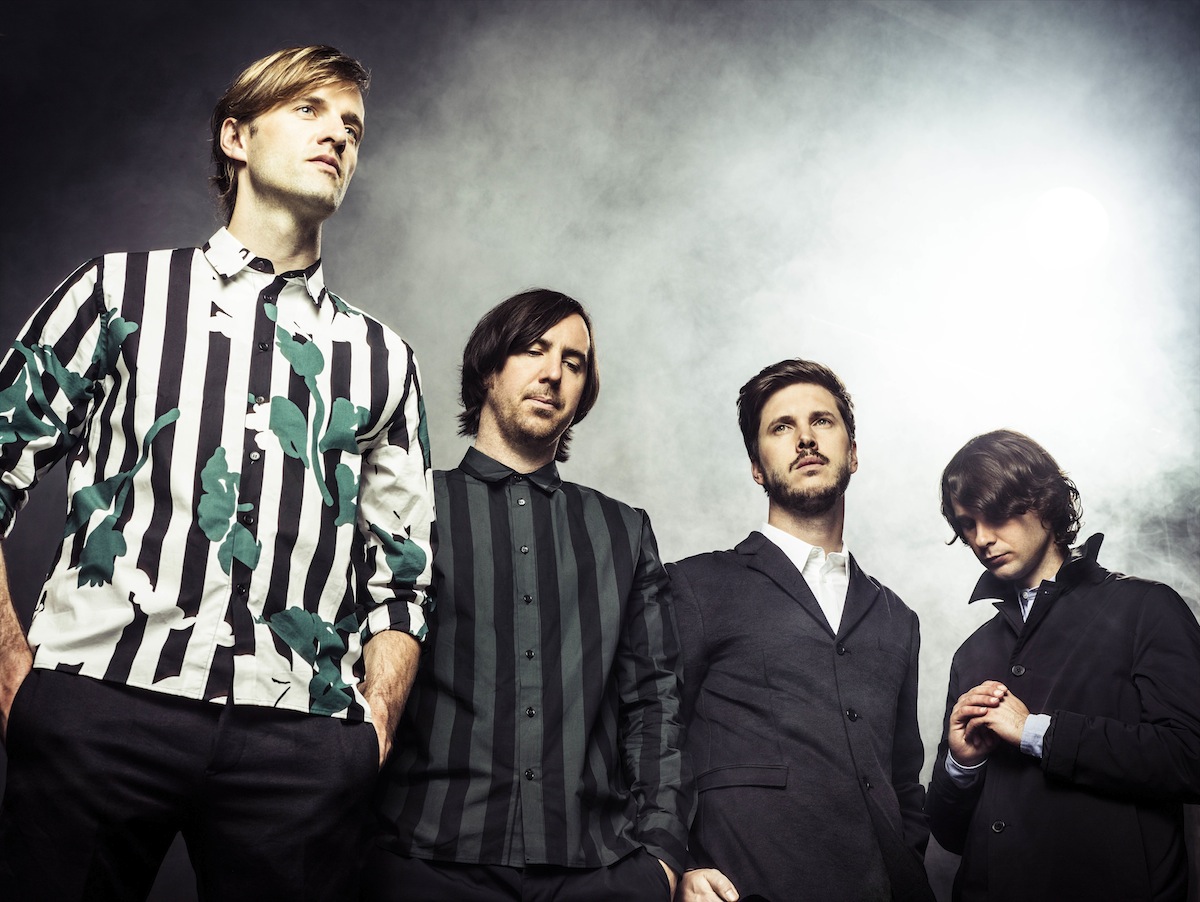
ABOVE: CUT COPY. IMAGE COURTESY OF MICHAEL MULLER
If Cut Copy’s fourth album proves anything, it’s that the band has adopted the “don’t give a fuck” attitude vocalist Dan Whitford says is inherent to the dance music genre. Free Your Mind leaves behind the more subdued style that enveloped 2011’s Zonoscope and makes no apologies for a new, urgently charged acid-house sound. It’s a record that takes risks and begs repeat listens—and boogies. Even the three tracks that bump the six-minute mark hold their own thanks to a party bag of gospel vocals, fat piano stabs, and ecstatic hand claps that punctuate Whitford’s disaffected melodies.
It’s not surprising, then, that Whitford pins Primal Scream and Happy Mondays as big influences on the album. What’s more enlightening is that the real spark was lit by Whitford’s rediscovery of his hometown’s underground club scene following his post-tour return to Melbourne early last year. Cue the third-summer-of-love concept, driven by the youth generation’s passion for house and techno music and the culture that underpins it.
On the day of our interview, Whitford and his three bandmates are in Nashville, Tennessee. They’re gearing up for the Free Your Mind tour, a gig trail that will no doubt see club and festival dance floors worldwide explode with audiences’ energy from the first bar to the final line. We could be critical and muse over how the album will endure after the trending ’90s wave breaks. But as Whitford explains, that would be to miss the whole point: not giving a fuck.
TEMPE NAKISKA: All things 1990s are big at the moment. How conscious were you of this as you were putting together the acid-house sound this album pushes?
DAN WHITFORD: After we got back to Melbourne from touring at the start of last year, I started getting into going out again as a punter and going to a lot of club nights. I just started enjoying the experience of dance music again. It’s completely different going out and experiencing it for your own interest’s sake, after having been making and playing it for so long. I tuned into a bunch of cool stuff that was happening in Melbourne and that led on to more specifically getting back into old school house music and the acid-house period. I think it’s a really interesting period for dance music; it was a real revolution within dance. I felt this real connection with that era and some of the scenes I was seeing around in Melbourne, even though it’s really underground and not really out there in the world as such, this dedication to house music is what it’s all about. It’s really inspiring.
NAKISKA: Do you feel like there is a resurgence happening?
WHITFORD: Well, even with In Ghost Colors, we were influenced by a lot of ’80s and ’90s house, so it’s not entirely a new thing for us. But getting into the U.K. stuff, it has a completely different flavor to it and there are different degrees of it: it’s not always dance music, there’s indie crossover stuff like Primal Scream or Happy Mondays. A lot of it’s nostalgic for me, hearing some of those Orbital tracks from when I was a teenager. At the same time, there’s a lot of deep house and indie music from recently that’s been very inspiring too. You have to keep pushing things forward.
NAKISKA: Which is definitely how this feels as well. I feel like this record has swung more towards electro from the electro-rock tag you always used to get. How was the dynamic in writing this time?
WHITFORD: We approached it completely differently; it was more methodical. Whereas in the past we might have spent a few weeks on a track, really working it up, then moving onto the next one and working on them one by one, I had this idea of trying to write as quickly as possible and just bang out ideas. So if I had an idea, I would bang it out in my own studio, and the next day I’d move onto something else and leave the previous song behind. After a couple of months, there were a hundred or so different song ideas which we went through with the band and picked out things we thought would be cool to work on. Working together we wanted to keep the process open too, like being in class, nobody was allowed to question or second-guess a new idea no matter how dumb it was. So there’s this whole concept of Free Your Mind behind the actual writing and recording process.
NAKISKA: I imagine that process would give you a bit more freedom to embrace more cheesy ideas too, like the Happy Mondays backing vocals and all those piano stabs …
WHITFORD: Yeah, totally! I think there’s an element to dance music generally where you have to just not give a fuck. Thinking back to those awesome nights you’ve had at clubs and parties, it’s when you really don’t care and you’re in the moment and just enjoying it all that the best times happen. Part of the thing with making dance music is you can’t be too critical about it. That’s what’s so inspiring about the house period: that it was a new idea and people didn’t even know what it was at the time, it was just experimenting. I think you have to have a bit of that same renegade attitude where you really don’t care. You’ve got to be out there on a limb trying things.
NAKISKA: Where did you record?
WHITFORD: We recorded in Melbourne, and I sat in the producer’s chair for most of that time, like with the previous record. But once we had finished recording, we had the idea of working with Dave Fridmann. We knew him quite well as a name from having worked with MGMT and The Flaming Lips and, more recently, Tame Impala. The records he makes are more band-oriented and psychedelic and weird, so we thought it would be a really interesting pairing. It was a lot of fun.
NAKISKA: Did it juice more creativity?
WHITFORD: It’s like any collaboration, the other party brings things out you would never think of otherwise. Often he’d take a track away and work on it for a few hours, and we’d come back in and listen to it and be like, “Wow, what did we just listen to?” and it would be completely different to what we thought the track would end up starting like. For instance, “Walking In The Sky,” the second-to-last track, when we first wrote it, it was very dreamy and ambient. We sat in the studio with Dave listening to his take on it, and he’d made the drums louder than anything else in the mix and basically inverted the whole track. At first we were shocked, but then realized it was actually really amazing. I think instances like that—where he took some creative license that we wouldn’t think to—ultimately, we’re so glad that happened.
NAKISKA: It will be those little changes that often keep you moving forward?
WHITFORD: Yeah, absolutely. I think any person we’ve ever worked with on mixing or producing our records, it’s almost like you steal a few of their little tricks each time. So after a while, you’ve assembled so many that you could almost produce your own record or do your own thing. Definitely Dave had more tricks than the average! It was cool to learn from him, because he’s a bit of a legend for us.
NAKISKA: You’ve been nailing the dance festival track formula pretty much since you started out. How fulfilling is that role?
WHITFORD: I guess if it wasn’t fulfilling, we would stop doing it. But making music for us is almost a selfish thing; it’s making art that you love yourself, and we just trust in our aesthetic and hope that other people will want to listen to it and enjoy it. We often get asked if we think about playing at a festival while we’re writing a track, but it’s really not about that. It’s just following our own direction. So it’s definitely fulfilling and kind of weird because we started out with no expectation of anything and just played shows locally in Melbourne. You know, we’d be happy to sell out The Tote in our early days! And from that stage onwards was beyond our goals. So everything that’s happened to us as a band for the past five or six years has really been a bit of a bonus.
NAKISKA: How would you picture the next youth revolution—the “Third Summer of Love”—looking?
WHITFORD: These things come out of times being pretty bad, you know in the late 1960s and in the ’80s in the UK. So in some ways I wouldn’t wish this upon the youth. In the past, these things have only happened because this has been the only way to explode out of hard times—with new ideas. Maybe youth will come up with something completely new, and I would hope they would. Obviously the thing that inspired me so much about them historically is just how potent they are in terms of art and music. It’s exciting that you see moments where art and music end up changing the world for the better.
FREE YOUR MIND IS OUT TODAY. FOR MORE ON CUT COPY, VISIT THE BAND’S WEBSITE.

